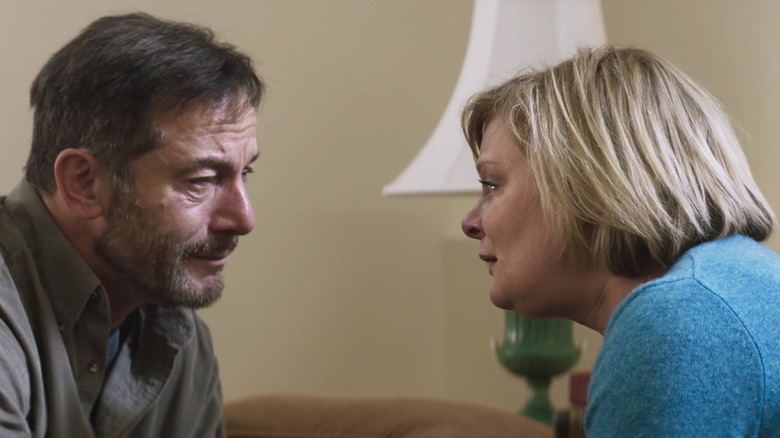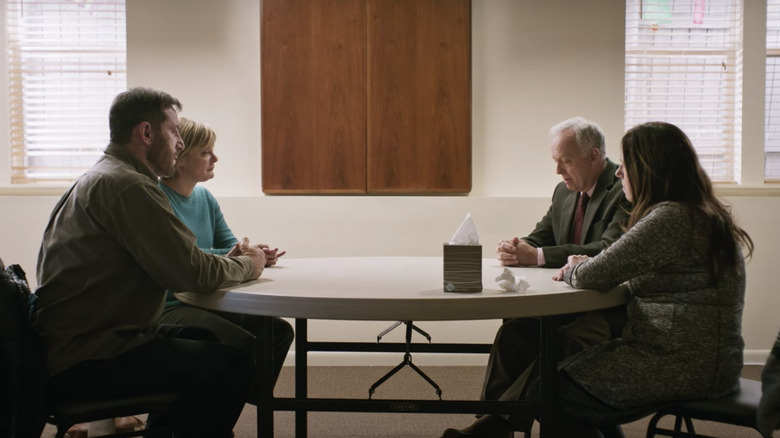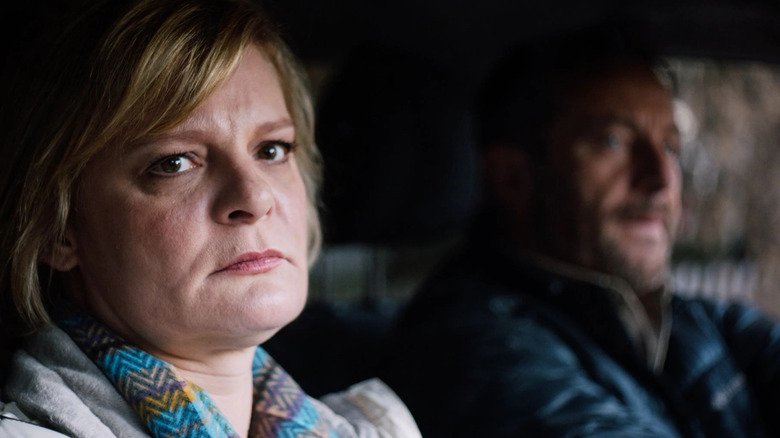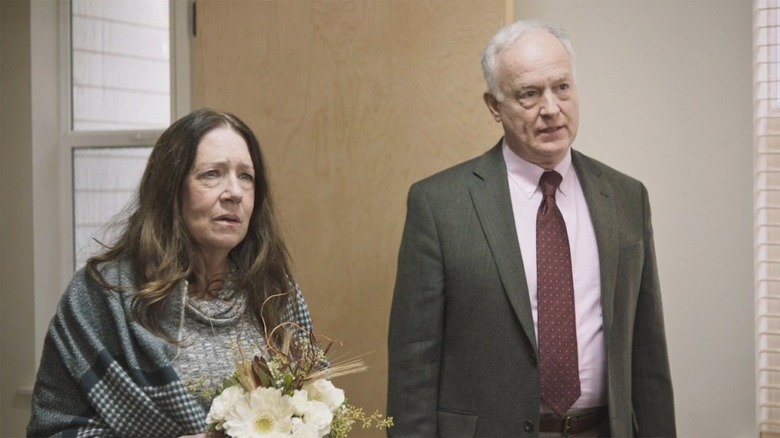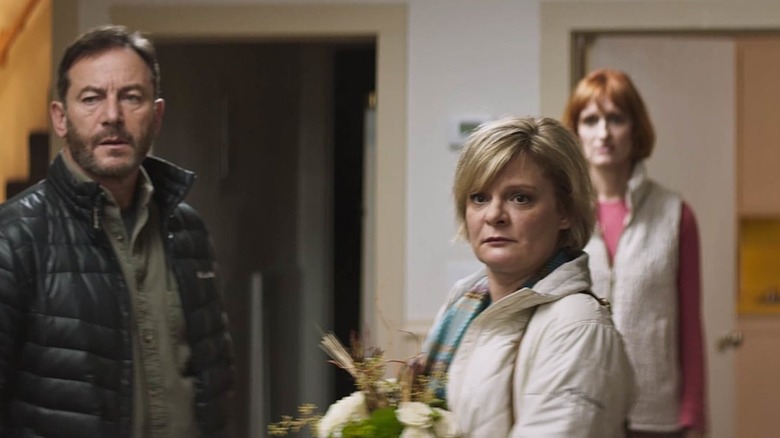Mass Director Fran Kranz Worries About Our Attention Spans [Interview]
Actor Fran Kranz takes a serious swing with his feature directorial debut, "Mass." Set almost entirely in one location, Kranz's film shows two couples coming together to discuss a tragedy involving their children and a shooting. Both technically and dramatically, it's an ambitious debut for the actor, known for "The Cabin in the Woods" and a variety of films and shows. As a first-time filmmaker, he shows care, sensitivity, and patience.
Kranz never wanted the camera to be omnipresent. He never wanted to call attention to himself or anything happening outside of the frame. It was all about restraint. After years of dreaming and trying, Kranz finally got to get behind the camera. Recently, the writer-director told us about his experience making "Mass" and what he hopes to direct in the future.
"I just worry about our attention spans."
There's no score in the movie, is there?
There's not. There's not technically. Three years ago, when I sort of had the idea, I want to make a movie about one of these meetings. Just as soon as I had that thought, I really believed I don't want any music. The only sounds or score, so to speak, would be the practical music that's happening in the church. I had the idea of the piano lesson and I had the idea of the choir. And knowing that I was going to bookend the movie with this practical score, or practical music, I wanted the conversation to be bare. I wanted it just to be about the actors and the musicality of performance. And that sounds really pretentious, but do you know what I mean? Without manipulating them or putting too big of a magnifying glass on it. Nothing against, what was it called, Quibi? Quibi?
That's it, yeah.
I really worry about... And I have a kid, and she wants screen time all the time. I just worry about our attention spans. I want to remind people that they have an attention span, that they can sit through a conversation, they can watch a movie that's just four people talking if it's compelling enough. If the conversation is compelling enough, we will sit through it. We don't need all the bells and whistles, we don't need special effects. I'm pretty down on Marvel movies and a lot of studio, franchise movies, just repeating things and remaking things. There is so much more originality out there.
I really wanted to believe that you could just have four people in the room, great actors delivering an emotional story, and just good storytelling, and that's all you need. And so, I had to fight for it. I mean obviously, ultimately it was my decision. But I wanted to listen to people, I was always collaborating. And there was always this question of, "You got to hire a composer." We did look at it. Darren Morze, who's our composer in the film, did this, I think, really beautiful music for the ending credits. We messed around with it, and he and I both agreed, as soon as you introduce music... For instance, Martha Plimpton has this emotional story towards the end of the film about her son. As soon as you have music underneath, it cheapens it.
It adds more artifice.
Yeah. And look, it might work in another movie. But the way that this movie was set up, that it does exist in real time, there is this sort of point A to point B, real time conversation that rests on realism and naturalism. To introduce music, it just feels false. And so we did play around with it. Kevin Seaton also created a really interesting sound design. You can hear it when you're outside of the church. When Jason Isaacs and Martha Plimpton are parked by this field, in their car, there are these noises that sounds like moaning or aching. But it also kind of sounds like construction far off in the distance. So it feels natural, it feels like the landscape are a part of the world, or some far off noise. But it, sort of, really speaks to the kind of human, subterranean emotion of the film, and sort of what's really existing in these characters lives.
We also developed barking dogs in the distance, at key moments, because we wanted the intensity of the conversation, the emotion, to also be contrasted or juxtaposed with ordinary life happening outside. So you have a truck beeping and going in reverse, you have a dog barking. These little sounds that subtly remind you, you are very much in the real world. And the ordinariness of life is all around us right now, and yet you're watching four people do something extraordinary.
"We did not want to try to reinvent the wheel."
Visually, how'd you approach the conversation? How'd you want to pace it? How'd you know when to cut?
Ryan Jackson-Healy, my cinematographer, and I, we had this little mantra of, "Don't get in the way. Don't let the audience ever feel the director." We talked about "My Dinner with Andre" a lot. And that movie has, basically, four setups, and it works. Maybe it's not for everyone. I love that movie. I can sit through that conversation, and I'm totally entertained and there, I'm with them. And so, we did not want to try to reinvent the wheel.
We called it "the system." It's not a very exciting word, but we had the system that we would stick to every day, at least in that room. We had two cameras, and we had two dollies. We'd kind of move back and forth, depending on where our light was. So we established our four sides of the table, each day in the same order because of lights in the windows. When it was darker, we were finally facing the wall, kind of thing, right? And then we sort of broke it down into mediums, singles, and closeups. It was just getting the coverage in the most basic way.
But each day, we knew we had this plan that as the conversation gets more emotional, the camerawork will sort of deteriorate, so to speak. That it will slowly become handheld and parallel, or sort of mirror, the intensity of emotion on screen. But we wanted it to happen very subtly. So at the beginning of the conversation, there's no more movement. There's these stable two-shots. We talked about "Scenes from a Marriage," the Bergman movie. So much of the beginning of that film it's just a two-shot. So we slowly introduced pans, movement. And then finally, when Jason Isaacs gets up for a sip of water, and he's also quite frustrated in that moment, that is when we break into handheld. And by that point, I think it's about 50 minutes into the conversation, we've developed or we've introduced enough, I think, subtlety and movement that hopefully the audience isn't completely even aware that you've reached handheld. That the camera's now in a handheld, is being handheld.
We got this shot from "Moonlight," the very first shot of "Moonlight." It's resting on the hood of a car, the camera, and then as Mahershala Ali gets out of the car, the camera sort of jerks up, and gets into a Steadicam and starts moving around. It's a really, really great shot. So we talked about that, in terms of Jason Isaacs getting up from the table and all of a sudden, "Whoa, now we're in this handheld world." For something that feels contained and simple, we obviously gave it a lot of thought.
And then when I was in the editing room, if we ever felt like there was a shot that smelled too much like a director making a choice, we cut it. We wouldn't use it. If the dolly was too present, if the pan was just too perfect, if it timed itself, we wanted to stay away from that. It was crucial that the audience was just always there at the table with the four actors and the four characters. If it ever felt like, "Oh, that was a nice move," then we'd be breaking that illusion, right? And then, look, at the end of the day, it was my first time directing, so I was like, "Well, let's not try and do some long Steadicam through the church like I'm Martin Scorsese or something."
"It's a difficult profession, a lot of rejection, a lot of disappointment."
It's a contained story, but a big story, as well, given what it's about. Gun control is touched upon only briefly. Sometimes, when a movie covers a sensitive subject, sometimes dialogue unintentionally sounds more like talking points than people simply talking. Did you want to avoid that?
Completely. And I'll be totally honest, the first drafts of the screenplay of "Mass," well, it was called something else back then. The first drafts are so bloated with stuff like that, I'll be honest. I established these sort of four points of view, or these four characters. And less with an agenda or, sort of, a set of beliefs, but more as just who they were and how they were affected by a shooting. So it was just the father of the shooter, how can I imagine being in his shoes? The mother of the shooter, same thing. And then the mother and father of a victim. So I tried to improvise dialogue as those characters. But I was sitting on this kind of mountain of research that I'd been doing over the course of two years, so I had a tendency to go into more political rhetoric and opinions. It was a large part of the screenplay.
And I think much of the early writing process was just what you said, in that I had to really think about the character more than the opinion. I mean, there's a scene in the movie where Gail, Martha Plimpton's character, says, "Why are we talking about this? I didn't come here to talk about f**king politics." In the film, I think they barely get into it. It's about a minute and a half where they start kind of going down that road. Initially, that scene was probably five, six pages of back and forth.
Every time I'd go back to edit it, I'd say, "This is going on too long. She would cut them off then. She would cut them off then." And then we'd do a read-through with some actors and I'd ask them, "At what point were you frustrated? At what point could you not stand to hear this any longer?" And then it would get earlier and it would get shorter. So looking back, I realized there was too much research in the dialogue and not enough of the human emotion. And that was a big part of the early writing process, was knowing what was truthful to the character. Or knowing what was an author venting his opinion about these tragedies on a political level, on a societal level, on a cultural level, as opposed to the personal.
Excavating the personal out of the political, so to speak, was the big challenge of the first several months of writing, for sure. I think the script ended up where it needed to. I'm proud of where it is, but I know that there was a lot of that. And sometimes I feel like it was just my way of justifying my own research. It was almost as if I had to put it all on the page as a way of proving to myself I come at this with some authority or legitimacy. And then it was a way of, "Okay, now we don't need this. Now we don't need any of this. Now it just has to be about the suffering, and the yearning, and the longing of what these characters want." And they're not going to sit around on a soapbox for very long, you know?
When did you first want to direct? When did that become an ambition?
It's sort of a lame answer, but my whole life. I mentioned Martin Scorsese, I was always making mafia movies when I was a kid, with my brother and I. We'd make fake blood and have these weird shootouts shot with my home camcorder, things like that. No, I've always sort of dreamed about it. I would always say, "Next year I'm going to do it. Or this year I'm..." And I would write scripts and they just weren't... I couldn't get them to completion, or the idea wasn't something that I could get people behind. I think this started happening around 36, 37. When the Parkland shooting was, I was about, maybe, 37. I'm 40 now. So obviously, it's taken me a long time to realize this dream of mine.
I think a lot of it had to do with the frustration of being an actor. It's a difficult profession, a lot of rejection, a lot of disappointment. And then also, being a father, finally being a parent. I felt I don't want her to see me frustrated about dreams that I'm not being more proactive about realizing myself. And I don't care if I fail, or if the movie's terrible, or what, but I got to at least try. I want to be a role model or be a parent that shows her you make the effort. And so, Parkland happened, and she was about one and a half. And then I just kind of felt like a man on a mission, and I made the movie like my life depended on it. So Parkland was February 2018 and we were shooting November 2019. So, it happened pretty fast.
"I feel like this will linger."
Do you ever see yourself directing yourself in one of your movies?
No, no. I had no intention, no interest in doing that on this. I mean, there wasn't a character for me, but I also... And that wasn't by design, this was the story. And no, I had no interest in that. I felt like I got to get this one under my belt and see how all goes before I think about that. But now having done it, I definitely would be interested in doing that. I don't know about being the lead of a film. Who's done that?
Warren Beatty.
Kenneth Branagh. Yeah, Warren Beatty. Maybe one day. At least for now, at this stage, it'd be more fun to just kind of show up in some weird role. I mean, not like a Hitchcock cameo, but just bigger than that. I don't know about a lead role. Maybe one day. Just to be honest, you sit around watching dailies for so long, I don't know if I would enjoy that if it was my stupid face. Kind of just be like, "Ugh." I'd never want to act again if I had to watch myself for that long.
I've heard some of those actor-directors say they end up discovering a lot of their bad habits as actors.
I know. It's really funny, the editing process is also mortifying because you see your bad habits as a director, too. Because the camera is on the actors. And if you roll over there and give them direction, and they're kind of not feeling it, you have to go relive that. You have to relive every, sort of, dispute with your actor, or frustration from your cinematographer. So often, the camera's still rolling, so a lot of these things were captured on camera and I have to suffer through them over and over again. As an actor, I mean look, we'll see. Maybe one day I'll do it. But it feels like a nightmare to watch my dailies. I don't even really watch myself very often, anymore.
Since you made them as a kid, how about a gangster movie?
I don't know. This is is sort of insensitive given the subject matter of "Mass," but I always loved action movies and, obviously, crime movies. A big Scorsese fan. I loved all that stuff, I still do. I would love to make bigger budget action films. I mean, I do have some ideas. But to be honest, a dream of mine would be to make something like "The Iliad." I want to make sword and sandal epic, that kind of Ridley Scott-like period piece. Those are things that really excite me. I mean, my favorite movie growing up was "Star Wars." I love the idea of one day making something bigger budget, action-adventure.
I'd like to think my second movie is very much informed by the real, long-term response to "Mass." Because it doesn't feel totally appropriate to go jump off, and try and make an action movie, in my mind. I feel a deep respect to the subject matter. If I'm lucky enough to direct another movie, I probably will need to make something emotionally more, or tonally more, like "Mass." Just for my own soul and peace of mind, you know what I mean? I think it's something that I couldn't just rip the bandaid off or say goodbye to so easily. I feel like this will linger. So much of the emotion of it will probably linger into the next project, if I'm lucky to get it off the ground.
"Mass" is now in theaters.
